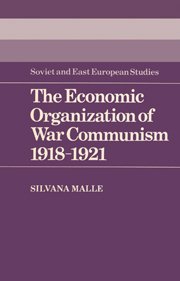Book contents
Summary
THE FOOD PROCUREMENT ORGANIZATION: LEGACIES
During the First World War, a series of measures were undertaken by the Tsarist government to control the market in cereals and raw materials. The peculiar location of industry in Russia made the problem of food supply harder than in other countries. The producing regions formed a semicircle around the largest areas of consumption in the north, northwest, west and centre of the country. The largest consuming regions absorbed a yearly average of about 241 million puds of the principal cereals – wheat, rye, oats and barley, which were provided by other regions. The largest industrial centres belonged to the consuming regions. The producing belt included the Ukraine, Novorossiisk, and the Central Agricultural Regions from the south-west to the south-east of Russia. The south-western, Ukrainian and south-eastern regions produced the four principal cereals and dispatched a total of 228 million puds of rye and wheat, plus 30 million puds of barley.
The transport system suffered from chronic shortages of rolling stocks, low capacity of the lines and uneven geographical distribution of the railway network. As compared with other countries, pre-war Tsarist Russia revealed its backwardness in this field. Russia had a tenth of the length of German railway lines per 100 sq. km. and about an eighth of the French. Total Russian railway capacity was less than half the German and about a third of the French. The maximum capacity of the lines east of Petrograd–Moscow–Kharkov–Sevastopol was only a third of that in the western part of the country.
- Type
- Chapter
- Information
- The Economic Organization of War Communism 1918–1921 , pp. 322 - 395Publisher: Cambridge University PressPrint publication year: 1985



